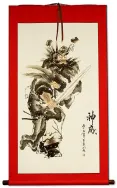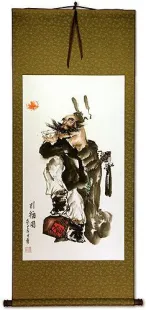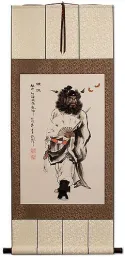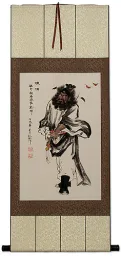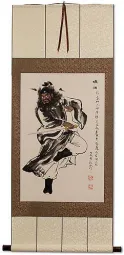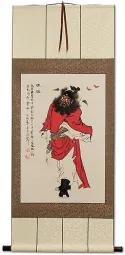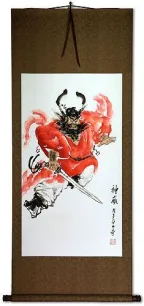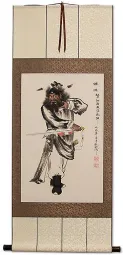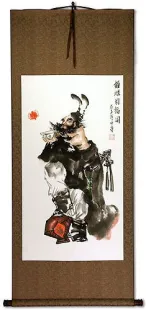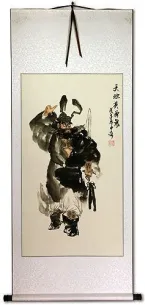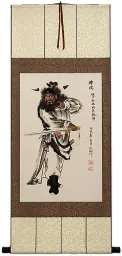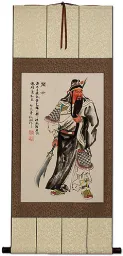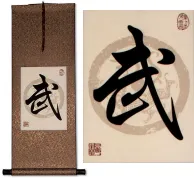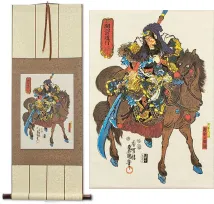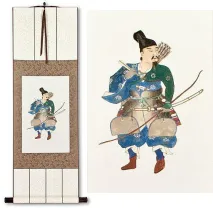Ancient Chinese Warrior Li Kui
The Black Tornado
Wall Scroll
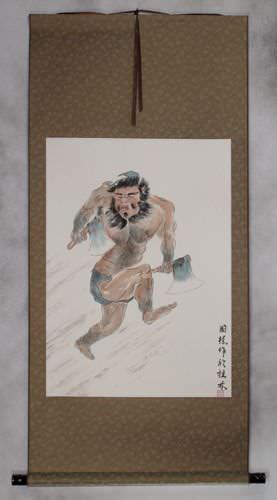
49"
26½"
Typical Gallery Price: $50.00
$21.00Sold Out
Sorry you missed it.
• Handmade Wall Scroll.
• Money-Back Guarantee.
Approximate Measurements
Artwork Panel: 49cm x 68.5cm ≈ 19¼" x 27"
Silk/Brocade: 58.3cm x 124.5cm ≈ 23" x 49"
Width at Wooden Knobs: 67.3cm ≈ 26½"
Information about caring for your wall scroll




Ancient Chinese Warrior Li Kui, The Black Tornado

Close up view of the warrior artwork mounted to this silk brocade wall scroll
DISCOUNTED: This one has been on our shelves for a while - nothing wrong with it, just time to move the inventory.
If you think this warrior is ugly, that just means the artist has captured the essence of this, the ugliest warrior in Chinese history.

A close up view of the painting of
Li Kui, ancient Chinese warrior,
mounted to this silk wall scroll
Alongside Lu Zhishen, Li Kui was one of the strongest amongst the 108 Outlaw heroes. Nicknamed "The Black Whirlwind" or "The Black Tornado" and sometimes called "Iron Ox". Li Kui was very tall and seldom took a horse to the battlefield. He would instead brandish his famous twin axes and hack his way through his foes.
Li Kui was born with a dark complexion, fiery eyes, a muscular body and strength equivalent to an ox, hence his nickname. He had a bad temper and an addiction to wine, so many people were afraid of him. He was excellent in using a pair of axes and also tough in melee fighting as well often raging ahead in the forefront of a battlefield entirely naked.
He was originally from Baizhang Village, and fled from home after killing someone. He came to Jiangzhou and served as a jailer under Dai Zong. Li Kui got to know Song Jiang and they became fast friends. He was extremely loyal to Song Jiang and when Song Jiang had a craving for fish, Li Kui went to the river and had a fight with Zhang Shun and the fishermen just to get fish for Song Jiang. However, the fight was stopped by Song Jiang and Dai Zong.
When Song Jiang and Dai Zong were arrested and scheduled to be executed, Li Kui and the Outlaw heroes stormed the execution ground and rescued them. They escaped to Bailong temple near the river and were surrounded by government troops. Li Kui and the heroes dashed out and fought fiercely, eventually cutting a path out to meet Zhang Shun with his boats. The whole group went to Liangshan after that.
Although Li Kui was fiery-tempered, he was a filial son. He went home to fetch his mother to Liangshan and met Li Gui who pretended to be him, robbing passerbys. Li Kui defeated Li Gui after a brawl and wanted to kill him for impersonating himself and committing crimes in his name. Li Gui lied that he had a 90 year old mother to feed and had no choice but to rob. Li Kui was moved and let him off. Later, Li Kui found out that Li Gui had lied to him and was plotting to capture him. Li was furious and later killed Li Gui.
Li Kui reached home and carried his blind mother all the way on his back, hoping to share wealth and woe with his mother at Liangshan. His mother complained that she was thirsty and Li Kui immediately went to find water for her. When Li Kui returned, he was horrified to find that his mother had been attacked and killed by tigers. Fuming, he stormed into the tigers' lair and killed all four of them.
Li Kui became one of the leaders of the Outlaw infantry. He often charged fiercely into battle and no one could stop him. He followed the heroes on their campaigns against the Liao Tartars and southern rebels. He was one of the few lucky survivors after the campaigns. He was offered an official post in Runzhou, Zhejiang, but showed little interest in his career. When Song Jiang was poisoned by evil and corrupt officials, he was worried that Li Kui might stir up trouble after his death by avenging him. Thus, he invited Li Kui to Chuzhou, where both of them committed suicide by drinking poisoned wine. Li Kui's last words were that he wanted to be buried together with Song Jiang after his death.
Li Kui is one of the most memorable characters in the "Water Margin", often ridiculed and used for comedic effect, Li Kui represented both a light and dark side of the bandits. Li Kui's exploits with Luo Zhong Ren (a living daoist God), and his journeys with Yan Qin represented the most humorous side of the "Water Margin" classic.
This information about Li Kui was obtained from Wikipedia
Used in compliance with the GNU Free Documentation License.
The story behind this series of Ancient Chinese Warrior paintings:
The warriors in this series of paintings come from a classic Chinese novel written about 650 years ago. The novel can be compared to Homer's Odyssey, because much of the story is based on and/or matches historical facts of ancient China. Nobody seems sure if these legendary warriors are real, myth, or a combination of the two.
It is difficult to translate the title of the novel into English, but some translations of the novel into English have titled it in the following ways:
All Men are Brothers
Outlaws of the Marsh
The Water Margin (This is the direct Chinese translation into English, we'd probably say, "The Marsh")You can find several translations of the whole novel in English on Amazon if you are interested in the story. Just look for one of the above titles.
The story covers the trials and tribulations of 108 outlaw heroes. These men and women were persecuted and banished to the marsh by corrupt officials of the Song (Sung) Dynasty.
This group, over the years formed an army of warriors that fought against the government. The often raided official riches, and distributed the wealth among the poor (and of course themselves). For this fact, they are often compared to the story of Robin Hood. But don't let that fool you. These were some of the most ruthless characters of ancient China. They were no angels.
My personal notes on the novel: If you get a chance to read the novel, you will find suspense, romance, a lot of character development, and of course, a whole lot of violence.
The violence they inflict was not something that most of them desired in their hearts, but something that their circumstances forced them to portray. The loyalty and honor of these warriors to each other, and their cause becomes extreme through time. The whole story is really about the love, duty, and honor of these "Warriors of circumstance".
About the Artist
The artist's name is Ou-Yang Guo-De of Guilin, China.
This item was listed or modified
Sep 23rd, 2012
Typical Gallery Price: $50.00
$21.00Sold Out
Sorry you missed it.
